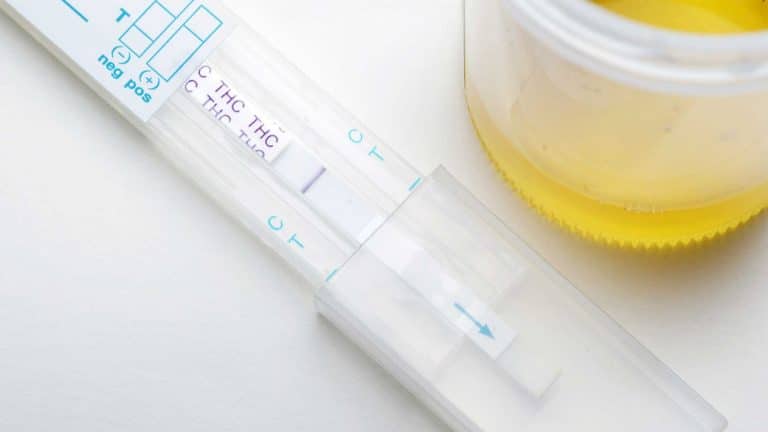Failing A Drug Test On Probation | What Happens & What You Can Do

Throughout your probation, you may be subjected to random drug tests, as sobriety is one of the most common conditions of probation.
It can be difficult to meet this condition, especially if you struggle with substance use disorder (also called drug addiction). That’s why it’s important to understand the consequences of a failed drug test and how you can mitigate them.
What Happens When You Fail A Drug Test On Probation?
The consequences of a positive drug test result depend on a variety of factors, including:
- your original sentence
- the specific terms of your probation
- whether this is your first violation of probation
- the state you live in
In most cases, if it’s the first time you have failed a drug test, your probation officer may let you off with a warning.
If it’s not your first offense, your probation officer may file for a probation violation hearing.
What Happens At A Probation Violation Hearing?
During a probation violation hearing, a judge will determine the consequences of your failed drug test. In some cases, you may receive a fine, community service, or an extension on your probation period.
However, hearings are likely to result in either probation revocation or court-ordered rehab.
Probation Revocation
If your probation is revoked, you’ll likely have to complete your original jail sentence. However, sometimes, the judge may give you a shorter sentence.
Court-Ordered Drug Rehab
If you live with drug addiction, the judge may sentence you to drug rehab as an alternative to jail time. You’ll be sentenced to either inpatient or outpatient rehab, depending on your needs.
People with moderate-to-severe addictions are likely sentenced to inpatient rehab, where they’ll receive 24/7 care. People with milder addictions are often sentenced to outpatient rehab, which means they’ll regularly attend a treatment program while still living at home.
If you refuse to attend court-ordered rehab, you’ll face serious consequences, including large fines and jail time. The judge may also increase your original sentence.
What To Do If You Get A Warning
If you get a warning, you can avoid harsher penalties in the future by staying sober.
However, even if you know you risk jail time, you might feel unable to stop using drugs. This suggests that you have drug addiction. This disease makes you feel unable to stop using drugs despite negative consequences, including criminal charges.
Other signs of drug addiction include:
- frequent mood swings
- loss of motivation
- loss of interest in activities you once enjoyed
- tolerance (needing increasingly higher or more frequent doses of a drug to feel the desired effects)
- physical dependence (experiencing withdrawal symptoms, such as anxiety or sweating, when you don’t use drugs)
If you experience these symptoms, seek help at a drug addiction treatment program. These programs offer a variety of recovery-focused services, including:
- medical detox, where doctors will help you slowly and safely stop using drugs
- therapy, where you’ll learn how to manage drug cravings and cope with any underlying mental health concerns that contribute to your drug abuse
- medication-assisted treatment, where doctors prescribe medications to reduce cravings and withdrawal symptoms associated with certain types of addiction
- support groups, where you can share your experiences with other people recovering from drug addiction
What To Do If You Get A Hearing
If your probation officer files for a probation violation hearing, you may want to hire a criminal defense attorney. They can help you receive a fair sentence. For instance, if you live with drug addiction, the attorney can argue why you should receive court-ordered rehab instead of jail time.
If you get sentenced to court-ordered rehab, you may receive a list of low-cost or free treatment centers to consider. However, these centers usually have long waitlists. In addition, they might not provide the quality of care you need.
For example, not all treatment centers offer mental health/dual diagnosis treatment, so you may want to research a variety of centers instead of just the ones recommended by the court. In general, you can choose any treatment center you want as long as the judge approves it.
Does Court-Ordered Rehab Work?
Some people assume that those who attend court-ordered rehab have poorer treatment outcomes than those who enter rehab voluntarily. However, according to the National Institute on Drug Abuse, court-ordered rehab is just as effective as voluntary rehab.
No matter which type of rehab you attend, addiction treatment helps you maintain long-term recovery and pass future drug screenings.
If you or a loved one struggles with drug use, please reach out to an Ark Behavioral Health specialist. Our inpatient and outpatient rehab centers provide personalized, evidence-based treatments to help you stay drug-free.
Written by Ark Behavioral Health Editorial Team
©2024 Ark National Holdings, LLC. | All Rights Reserved.
This page does not provide medical advice.
National Institute on Drug Abuse - Is legally mandated treatment effective?
National Institute on Drug Abuse - Understanding Drug Use and Addiction DrugFacts
United States Sentencing Commission - Federal Probation and Supervised Release Violations

Questions About Treatment?
Ark Behavioral Health offers 100% confidential substance abuse assessment and treatment placement tailored to your individual needs. Achieve long-term recovery.
100% confidential. We respect your privacy.
Prefer Texting?
Our friendly support team is here to chat 24/7. Opt out any time.







 Learn More
Learn More








